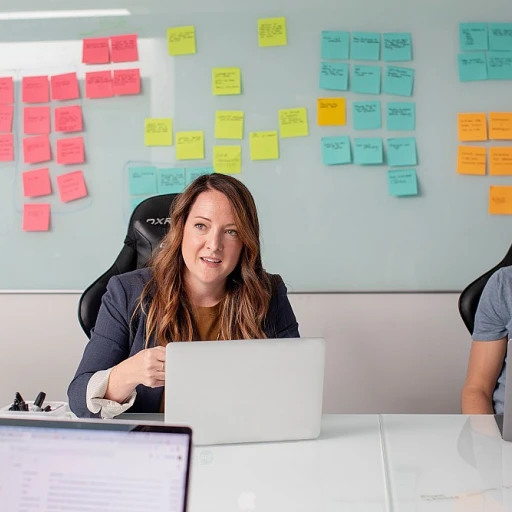
Understanding the Role of Interview Questions
Interview questions play an integral role in the hiring process, serving as the bridge between a company’s hiring team and potential new hires. The craft of asking questions that truly dive into a candidate’s capabilities, experiences, and fit for the role can define the success of the recruitment. Understanding the role of these questions is crucial, not just for assessing a candidate’s qualifications, but also for ensuring that they align with the company culture and long-term objectives.
When conducting interviews, it is critical to comprehend the purpose and implications of the questions posed. These questions are more than just tools for evaluation; they are instrumental in revealing how a candidate will potentially handle various aspects of the job and integrate within the team. Skilled interviewers recognize the power of their questions in unveiling both soft skills and technical expertise. Additionally, the questions are tailored to uncover decision-making and problem-solving skills, which are vital for many roles.
A well-structured interview question helps assess a candidate’s readiness for the job. By focusing on key questions that target the core competencies required for the position, employers can gain insights into how candidates will perform in real-world situations. This approach also aids in identifying how candidates have managed work-related challenges in the past. Employing a combination of behavioral and situational inquiries ensures a comprehensive assessment of a candidate's potential.
Moreover, in today's competitive job market, crafting effective interview questions is an art that impacts the company's ability to attract and retain top talent. Companies seeking global talent may explore practices such as offshore hiring to leverage diverse skills, which requires precise questioning to ensure the right candidate is selected. Therefore, paying attention to the design and intention behind interview questions can provide significant advantages in recruitment efforts.
Types of Questions to Consider
Various Question Types for Different Interview Goals
Crafting the ideal set of interview questions involves understanding the specific needs of the role and the overall goals of the company. Different types of questions serve various purposes and can help assess a candidate's suitability for the position. Below are some key question types to consider:- Open-ended questions: These questions allow candidates to provide more elaborated responses, offering insights into their thought processes, motivations, and overall fit within the team. For example, asking candidates to "describe a time they handled a challenging work situation" can reveal a lot about their problem-solving and decision-making skills.
- Targeted questions: Whether focusing on the role's core requirements or the company culture, targeted questions help interviewers delve into specific areas. For instance, inquiring about a time they contributed to a project that had a long-term impact on their team may provide valuable information about their capacity for strategic thinking and collaboration.
- Hypothetical questions: These assess candidates' potential to innovate and make decisions when faced with new or unforeseen challenges. Situational questions can be especially insightful, as they encourage the candidate to describe how they would manage a hypothetical situation, which, in turn, reveals their approach to problem-solving.
- Skill-based questions: Evaluating a candidate's technical expertise and knowledge is crucial, especially for roles requiring specific skills. These questions might include scenarios where the candidate must apply their skills in a practical context.
Behavioral Questions: Delving into Past Experiences
Exploring Past Experiences Through Behavioral Inquiry
Delving into a candidate's past experiences is instrumental in understanding how they might handle the responsibilities and challenges presented by the new role. Behavioral questions are designed to assess a candidate’s ability to utilize soft skills that are critical to success within the team or company culture. Behavioral interview questions often start with prompts like "Describe a time when..." or "Tell me about a situation where..." These open-ended questions allow candidates to provide insights into their previous work environments, decision-making processes, and how they’ve contributed to their team's success. Here are some key questions that can offer a deeper insight into a candidate's past behavior:- Describe a time when you had to overcome a significant challenge at work. This question will help assess the candidate's problem-solving capabilities and resilience.
- Can you provide an example of a situation where you had to work under pressure? It’s a fundamental question for evaluating how candidates manage stress, a critical element in many high-pressure roles.
- Share an experience where you successfully handled a conflict with a colleague. This is crucial for assessing interpersonal skills and the candidate’s ability to contribute to a harmonious team environment.
Situational Questions: Assessing Problem-Solving Skills
Assessing Candidate Problem-Solving Skills
In any recruitment process, it's essential to evaluate a candidate's ability to handle unexpected challenges. Situational interview questions are designed to assess this very skill. Unlike behavioral questions that delve into past experiences, situational questions present a hypothetical scenario. The question will typically ask candidates to describe how they would handle a given situation. This method helps in assessing a candidate's problem-solving skills and their potential response to real-world challenges.
When crafting these questions, it's important to tailor them to the specific role and its demands. Here are a few key questions to consider:
- Describe a time when you had to solve a problem with limited resources. What was your approach and what was the outcome?
- Imagine you are part of a team that disagrees on how to complete a project. Describe how you would handle the situation to achieve the best outcome for the company.
- A customer is unhappy with a service they received. How would you address this issue to ensure a positive resolution?
By analyzing the answers, interviewers can gain deeper insights into the candidate's decision-making process and their capability to work under pressure. Look for nuanced responses that demonstrate critical thinking, rather than generic answers. This can help identify candidates who not only fit the role but also contribute to the long-term success of the team.
Technical Questions: Evaluating Expertise and Knowledge
Tailoring Technical Questions to Match the Job Requirements
When it comes to technical questions during an interview, the focus should primarily be on assessing the expertise and knowledge that a candidate brings to the table. These questions can often be intricately tied to the specific requirements of the role in question, helping to ascertain whether the candidate is the right fit for the team's technical needs. Technical questions aren't merely about gauging a candidate's knowledge on paper; they're about assessing how they apply that knowledge to real-world situations. Hence, it becomes imperative to design questions that serve this purpose effectively. The best technical questions are those that push candidates to describe how they have handled similar situations in the past or how they might approach given problems when they occur on the job. For example, if the role involves software development, you might want to ask candidates about their experience with specific programming languages or tools. Questions such as "Can you describe a time when you optimized an existing system?" or "Describe a situation where you encountered a challenging technical problem and how you resolved it" will be insightful. These questions help in understanding not just the candidates' technical skills but also their problem-solving abilities. Moreover, technical queries can also aid in evaluating candidates' soft skills. For instance, asking them to describe how they worked collaboratively in a team to solve a technical issue can provide insights into their teamwork and communication skills. Lastly, while judging candidate responses, pay attention to their logical reasoning, decision-making, and an ability to explain concepts clearly. Candidates who can articulate their technical know-how coherently and confidently are likely to be the ideal fit for roles that demand collaboration and communication within the company. Ultimately, effectively crafted technical questions in the interview process will help uncover a candidate's long-term potential and ensure that the company is bringing in individuals who can contribute significantly to the role and the larger goals of the organization.Analyzing Responses: What to Look For
Analyzing Candidate Responses Effectively
The interview process is not just about asking questions but also critically analyzing the responses given by candidates. This process can help in assessing a candidate's ability to handle the role and integrate with the team. Here are a few key areas to focus on while analyzing responses:
- Clarity and Confidence: An effective candidate should provide clear and concise answers, demonstrating confidence in their responses. This shows their ability to articulate thoughts under pressure, which is crucial in any job role.
- Relevance to the Role: Evaluate if the answers connect directly to the role's requirements. For instance, when addressing behavioral interview questions, the examples provided should reflect previous work situations that are similar to what they might encounter in your company.
- Problem Solving and Decision Making: During situational questions, assess how candidates approach problem-solving and decision-making. The best answers typically involve a well-structured thought process and the integration of both soft skills and technical knowledge.
- Consistency across Answers: Look for consistency in their descriptions of past experiences. This consistency is critical to ensure candidates are genuinely representing their capabilities and experiences.
- Ability to Describe Situations: Pay attention to how candidates describe a time they faced challenges or a particular situation at work. This can reveal not only their problem-solving skills but also their capacity to handle long-term tasks and projects.
Evaluating these elements during the interview questions will help in determining the best fit for the role and the company. It’s essential to keep the focus on whether the candidate's skills, experiences, and personality align with the job expectations and company culture.












